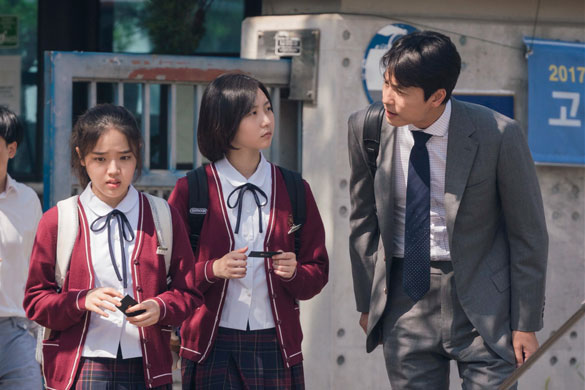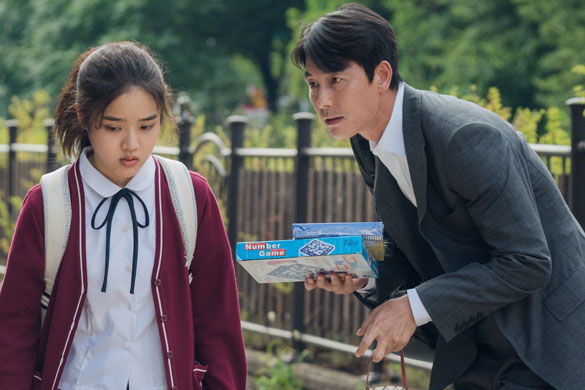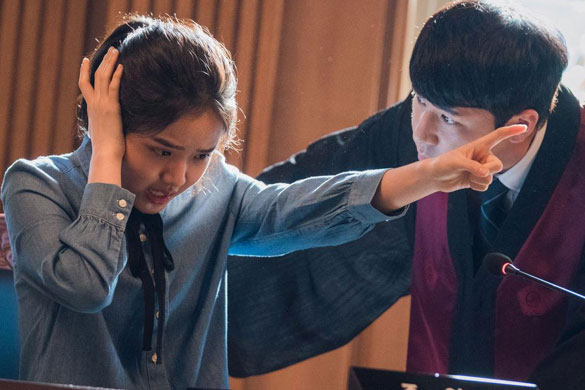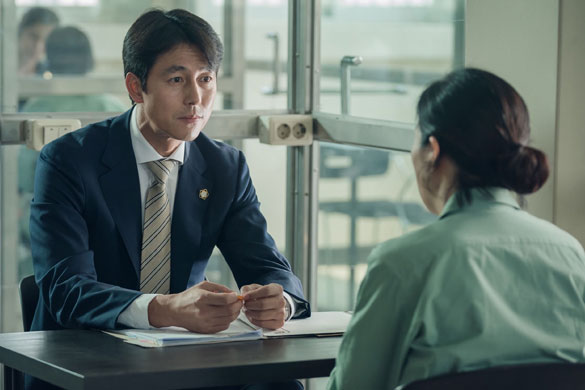"'Change my diapers', those were her first words. She'd just turned one.
While other babies could barely mutter 'mama' and 'dada', my Ji-woo spoke a full sentence.
She could read freely by the age of two, not children's books but newspapers. I thought she was a genius.
I never thought 'If only she didn't have autism' because then she wouldn't be my Ji-woo..."
Synopsis:
Soon-ho (Jung Woo-sung) is a 46 year old unmarried lawyer who lives with his ailing father. Highly thought of by his boss, in spite of clients claiming they feel uncomfortable in his presence, he is handed a pro bono case to defend a housekeeper accused of murdering the elderly man in her care and the fact that the sole witness to the alleged killing is a 15 year old child with severe autism instantly makes him lean towards believing the woman's claim of innocence.
However, to be sure of his defence strategy, Soon-ho quickly realises he will have to not only question the girl, Ji-woo (Kim Hyang-gi), in spite of her mother’s refusal to allow him to do so but also in the process find a way of connecting and communicating with her through the barricade raised by her mental disability...
Review:
While the court case/murder trial is of course at the core of proceedings with everything else revolving around it, Innocent Witness is as much if not more so a drama showing how Soon-ho’s various relationships have made him the man he is and indeed shape who he is set to become, even if he doesn’t realise it himself. On the surface, Soon-ho’s tireless attempts to connect meaningfully with little Ji-woo speak of the sheer difficulties she constantly faces in relating to others as a sufferer of 'autism spectrum disorder' and indeed the impediment to being understood by so called ‘normal’ people her condition brings, and that’s before we even mention the resultant persecution she suffers especially from her non-disabled classmates. However, that really is just the tip of the wedge, as it were, for director Lee Han goes to great lengths to allow viewers to gradually look through her disability to see the deeply intelligent child beneath and show that though her interactions may appear stilted and remote and her behaviour, numerous physical quirks and regular vocal outbursts decidedly odd and even off-putting, there are legitimate, definable and justifiable reasons for each and every one of her seeming abnormalities, for anyone taking the time to try to understand the world from her unique perspective.
This idea is beautifully and gently underlined in a conversation between Soon-ho and Ji-woo’s mother when he discovers how young Ji-woo was when she started speaking and how soon and quickly after that she learnt to read (her mother thought her daughter was a genius until prior to her mental disability diagnosis). Attempting to be sympathetic, Soon-ho states “If only she didn’t have autism” to which her mother responds that without her illness she wouldn’t be “my Ji-woo”. Soon-ho’s gradual understanding that Ji-woo is a person as legitimate as any other, albeit with mental issues, rather than simply being defined by her disability is also mirrored in his conversations and interactions with her as their relationship and trust builds. When he first meets her and tries to talk to her he noticeably bends down to her level and speaks in a very clear, measured, slow and kind of loud(ish) tone – like he’s talking ‘at' someone with a reduced mental capacity – but as they slowly get to know each other his conversations become far more natural, normal, human.
From Ji-woo’s perspective she knows she’s different but in a culminating scene outside her house in which she and Soon-ho talk about her having started at a special school (in a manner screaming of trust, understanding and even friendship on the part of both) Lee Han deftly points to the fact that that difference too comes from the point of view of ‘normal’ people with a lack of understanding. Soon-ho asks Ji-woo how she likes her new school and what her classmates are like to which Ji-woo replies they’re weird but that she likes it there because she doesn’t anymore have to pretend to be normal. Soon-ho then asks her how she managed to pretend and Ji-woo simply says she practiced. That telling statement in itself quietly but completely sums up everything Lee Han deftly says throughout Innocent Witness about humanity within disability.
 |
Again in terms of the slowly building relationship between Soon-ho and Ji-woo, it initially appears they are a universe apart – he’s mentally normal; has a successful career; is a productive member of society; and has (apparently) no problems interacting with all and sundry, whereas she is none of the above. However, one only has to look at his various 'normal' interactions - with his father (who’s absolutely obsessed with finding him a woman) and his refusal to discuss why he has never married or even ever brought a girl home; his on/off (increasingly off) friendship with a girl he went to university with and the fact that every time the relationship edges towards romance he messes everything up by opening his mouth and saying the wrong thing; or even his work clients’ statements that they feel uncomfortable in his company - to see that he has issues with interactions, openness and even empathy to a degree too and those around him at times fail to understand where he’s coming from.
Aside from him being a lawyer and Ji-woo dreaming of being one though she knows she never can be, it doesn’t take much of a step to see a link of sorts between normal man and disabled little girl even if their issue levels are entirely different and causally unrelated. I’d even go as far as to say that not only does this aid in Soon-ho’s ultimate understanding of Ji-woo and her’s (as much as she is capable) of him but also allows that understanding to help him gradually move through and past those very issues to truly bring normality back to his normal life, all thanks to his involvement with a deeply intelligent little girl who deserves to be seen as far more than simply mentally disabled.
 |
The trial sections of Innocent Witness are engaging throughout and on more than one occasion genuinely moving, and credit really must be given to Lee Han for pointing to the implication that at least some of Ji-woo’s autism-related issues are, depending on perspective, far more than simply disability weaknesses (in an almost positive sense), being, as they are, pivotal to the case at hand and indeed part and parcel of who Ji-woo is as a person. It does have to be said that many viewers will have figured out where the trial and other threads are going a fair way before they get there but while in most cases I would cite that as somewhat of a criticism the aforementioned case/autism intricacies (also alluded to in clues throughout the relationship segments) make for a thoroughly enjoyable viewing experience from start to finish, nonetheless.
However, Innocent Witness’ true and greatest strength is in the sheer uplifting warmth of the building relationship between Soon-ho and Ji-woo, helped yet further by exemplary performances from Jung Woo-sung and Kim Hyang-gi. Of the two leads, Kim Hyang-gi’s performance stands out the most, further proving the acting talent she showed so well in Thread of Lies (also directed by Lee Han), Snowy Road and the like. Playing a severely autistic character is no mean feat but Kim Hyang-gi pulls it off to absolute perfection. All that being said, the role of Soon-ho fits Jung Woo-sung and his perceived rep for playing well mannered, handsome ‘good guy’ roles like a glove and the combination of both performances is moving, emotive and genuinely sweet with the actors showing huge and palpable chemistry.
For many years in Korea, disability was pretty much a taboo subject with those suffering from physical and/or mental handicaps expected to be not seen and not heard (to paraphrase) – just take a look at Lee Chang-dong’s Oasis if you need a crash course into the shocking treatment the handicapped suffered on almost a routine basis. However, as perceptions have gradually changed and understanding has slowly grown, the disabled have become far more part of society and of course with cinema reflecting societal issues and movements, in recent years films such as Loveable, The Peach Tree and Planet of Snail (to name but three) have made great strides in showing humanity within disability with compassion.
As such, Innocent Witness not only serves as an engaging, sometimes moving thriller within a nuanced, sympathetic and affectionate relationship tale but also stands as a worthy addition to the (thankfully) growing number of Korean films shining a positive, compassionate light on the afflicted and showing that, though they may be handicapped, disability is just one chapter in their books, in no way defining who they actually are.
 |
Summary:
Part-courtroom-thriller/part-relationship-drama, Innocent Witness is wholly engaging throughout but it is the palpable, uplifting warmth seen in the depiction of the growing trust between an autistic young girl and an able-bodied man (helped yet further by a superlative performance from actress Kim Hyang-gi) that is the film's true and greatest strength.
INNOCENT WITNESS (증인) / 2019
Director: Lee Han
Starring: Jung Woo-sung, Kim Hyang-gi, Jang Young-nam
|





